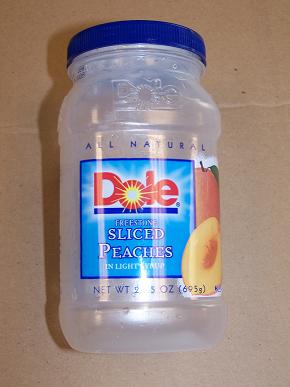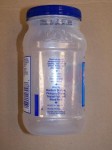
 If you look at the label on the pictured Dole product, you see that it is “natural”. I doubt any of us really understand what natural means anymore, but at least in theory, it’s a good thing, right? Shoppers everywhere just like my wife seek and buy products that are organic, pure and natural, even if the cost is a bit higher than those less healthy product options.
If you look at the label on the pictured Dole product, you see that it is “natural”. I doubt any of us really understand what natural means anymore, but at least in theory, it’s a good thing, right? Shoppers everywhere just like my wife seek and buy products that are organic, pure and natural, even if the cost is a bit higher than those less healthy product options.
I used to think these Dole peaches were delicious but I forever unintentionally ruined the taste by taking a closer look at the package and label. Near the top of the container you see ink jet characters that read “peaches from USA”. (Click on the thumbnail at right for a look.) I can only assume that is imprinted that way to give Dole some seasonal flexibility on where their peaches are grown and harvested. OK, I can buy that but at the bottom of the plastic jar you see that the shrink band label is printed ”Packed in Thailand.”
That means the peaches my family enjoyed traveled from somewhere in the USA – let’s assume the Southeast, where most of our peaches are grown – and then were shipped to Thailand to be processed and packaged before finding their way back to us in suburban Chicago. The only location we are certain about is where the wound up in Plainfield, Illinois, but a conservative estimate would tell us these peaches traveled over 20,000 miles.
I am sorry but there is absolutely nothing “natural” about that.
The Devil Is in the Detail
That was a favorite expression of a former co-worker and now I know I never gave him credit for how right he was. Once I realized the incredible journey my peaches endured, I scrutinized everything about the product and packaging. Why is this product packed in a plastic container that is marked with a recycled code #7 “other” on the bottom? What is the actual composition and where is it made? China or perhaps someplace not nearly as practical when you consider the packaging plant is in Thailand? Hmmm. What about that printed shrink band? Is it PVC? Honestly, I am not sure I want to know anymore about this product and package than I already do.
Low Cost versus High Carbon Footprint
I recently met a man who imports containers full of hand woven; “natural fiber” bags from China to sell to large retailers who are now very eager repent from their sinful plastic bag past. Perhaps I am more skeptical than the average consumer but how does that make sense? Does the low price point of the re-usable bag justify what has to be a tremendous carbon footprint? I won’t even mention our skyrocketing domestic unemployment rate.
Since I am in the box business, a friend made me aware that someone is now importing corrugated shipping boxes from India. The boxes come complete with a terrific, feel good; “buy fair trade and help a village out of poverty” story and I admit that is a great reasons to buy any product. However, I doubt the RSC style boxes being sold are hand assembled and painted by local artisans, so the sale is probably not benefiting anyone as much as the owner of the box manufacturing plant.
If we were experiencing a severe shortage of corrugated board, a lack of domestic box making facilities, or if we had simply depleted our supply of recycled corrugated board from which we could make more boxes, I could almost understand importing them from overseas. Fortunately for all of us none of those circumstances exists so I guess it is really all about profitability and to heck with the carbon footprint we leave behind.
After all, a carbon footprint is something no one really understands but everyone likes to talk about – especially when it’s someone else’s carbon footprint that is being discussed.


